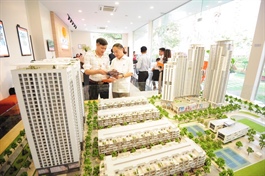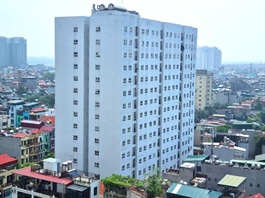Hanoi to develop five social housing projects
Hanoi to develop five social housing projects
The city would continue to explore opportunities to build new social housing projects to meet growing public demand.
The Hanoi People’s Committee has instructed investors to complete the planning process for five concentrated social housing projects in a combined area of 273 hectares.

A social housing project at Dong Ngac Ward, Bac Tu Liem District. Photo: Cong Hung |
To date, the authorities have approved the detailed planning for two projects at Tien Duong Commune, Dong Anh District.
The remaining three at Co Bi Commune (Gia Lam District), Ngoc Hoi Commune (Thanh Tri District), and Dai Mach Commune (Dong Anh District) are still under planning.
Hanoi’s authorities aimed to construct up to two social housing projects during the 2021-2030 period, and complete the preparation process for the remaining three.
In case of positive progress in the investment procedures for all three projects, the city would raise the target from two social housing projects in the period to five.
The Hanoi People’s Committee instructed the Department of Construction and Department of Planning-Architecture to soon proceed with the construction procedures of the two projects in Tien Duong Commune and propose new ones to meet the growing demand for housing.
In the 2016-2020 period, Hanoi built 34.8 million square meters of housing, surpassing the five-year target of 31.5 million square meters.
Under Hanoi’s housing development program for the 2021-2030 period, the city aims to build another 44 million square meters of floors between 2021 and 2025, including 1.25 million square meters of social housing, 560,000 square meters of resettlement houses, 19.69 million square meters of commercial houses, and 22.5 million square meters of detached houses.
Mobilizing resources for social housing development
Prime Minister Pham Minh Chinh during a national conference on social housing development for low-income groups held on August 1 stressed the Government’s priority in addressing housing needs for people of low income, which is seen as a key part of the country’s socio-economic development strategy.
Chinh called for new incentive policies to attract investment capital in developing social housing, especially from foreign investors.
At the conference, the Chairman of the Ho Chi Minh City Real Estate Association (HoREA) Le Hoang Chau expected preferential loans for investors in social housing projects, along with simplified administrative procedures for the issuance of land use rights.
“Favorable policies are necessary to encourage investors engaging in social housing projects and address an urgent need for housing from workers and low-income groups,” Chau said.
Chairman of Vietnam General Confederation of Labor Nguyen Dinh Khang suggested easing regulations on social housing development to allow wider public participation in the process, especially the people, and workers.
In the meantime, Khang hopes the authorities will prioritize securing enough land funds for social housing projects rather than commercial projects.
|
Over the years, Vietnam has been facing a shortage of social housing projects, which make up 70-80% of the public’s demands for living spaces. In contrast, the number of luxury projects has been increasing over the years and surpassed the actual needs. Data from the Ministry of Construction noted as of late 2021, the mid-to luxury apartment segment has over 70 million square meters of unused housing floors. By the end of June 2022, Vietnam has completed 279 social housing projects, equivalent to 148,000 apartments for 7.4 million square meters of housing floors. Of the total, social housing projects for workers at industrial parks have numbered 122 or 2.72 million square meters, and those in urban cities totaled 157, or 4.67 million square meters. The Government had targeted to have 12.5 million square meters of housing floors for social housing during the 2010-2020 period, but so far only 60% has been completed. |
























